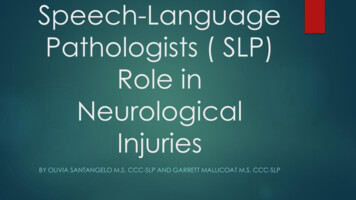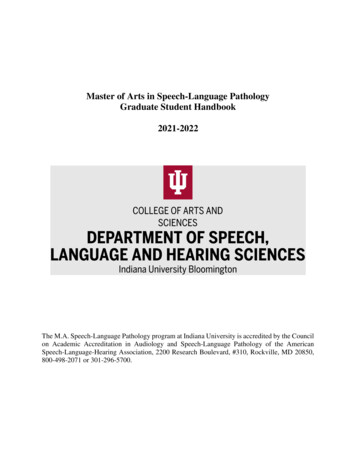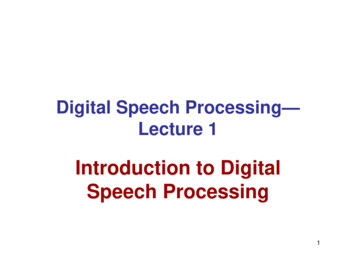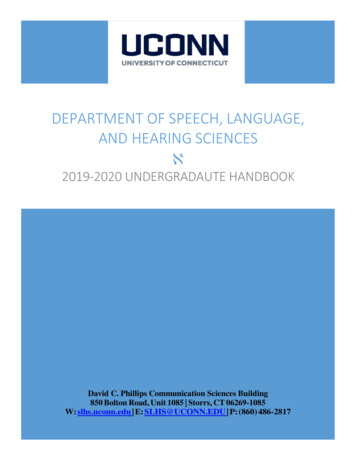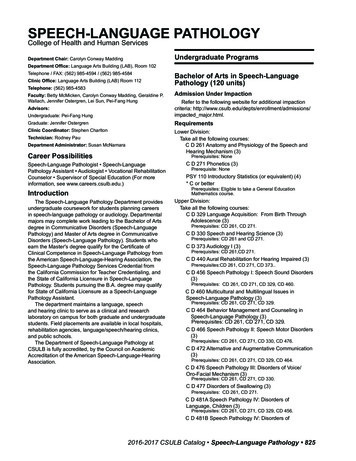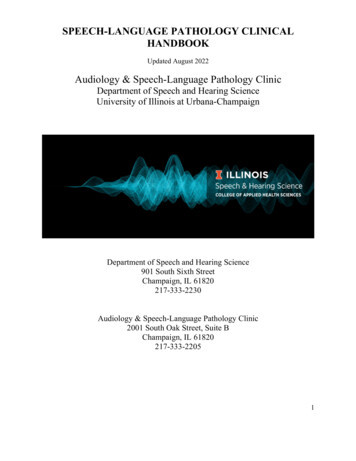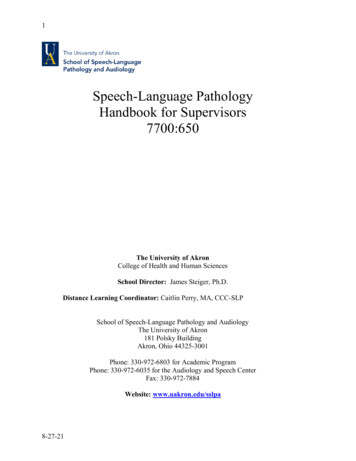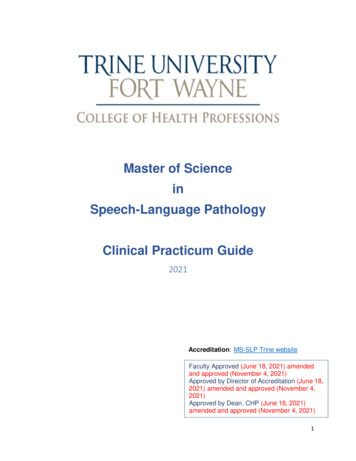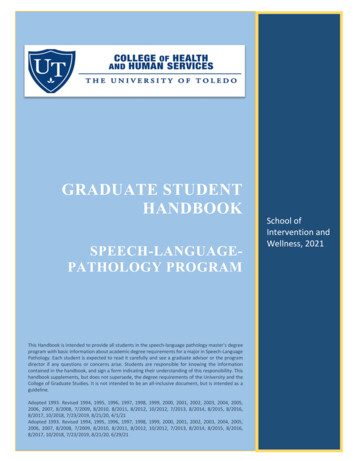
Transcription
GRADUATE STUDENTHANDBOOKSPEECH-LANGUAGEPATHOLOGY PROGRAMThis Handbook is intended to provide all students in the speech-language pathology master's degreeprogram with basic information about academic degree requirements for a major in Speech-LanguagePathology. Each student is expected to read it carefully and see a graduate advisor or the programdirector if any questions or concerns arise. Students are responsible for knowing the informationcontained in the handbook, and sign a form indicating their understanding of this responsibility. Thishandbook supplements, but does not supersede, the degree requirements of the University and theCollege of Graduate Studies. It is not intended to be an all-inclusive document, but is intended as aguideline.Adopted 1993. Revised 1994, 1995, 1996, 1997, 1998,2006, 2007, 8/2008, 7/2009, 8/2010, 8/2011, 8/2012,8/2017, 10/2018, 7/23/2019, 8/21/20, 4/1/21Adopted 1993. Revised 1994, 1995, 1996, 1997, 1998,2006, 2007, 8/2008, 7/2009, 8/2010, 8/2011, 8/2012,8/2017, 10/2018, 7/23/2019, 8/21/20, 6/29/211999, 2000, 2001, 2002, 2003, 2004, 2005,10/2012, 7/2013, 8/2014, 8/2015, 8/2016,1999, 2000, 2001, 2002, 2003, 2004, 2005,10/2012, 7/2013, 8/2014, 8/2015, 8/2016,School ofIntervention andWellness, 2021
MISSION STATEMENTSThe mission of The University of Toledo is to improve the human condition; to advanceknowledge through excellence in learning, discovery and engagement; and to serve as adiverse, student-centered public metropolitan research university.SCHOOL OF INTERVENTION AND WELLNESSThe mission of the School of Intervention and Wellness is to foster excellence in the nextgeneration of helping professionals, at all entries of practice, through collaborative, innovative,and experiential learning, research, and service activities. This is accomplished by engaging thecommunity through deliberate intervention and advocacy to advance the quality of life for theindividuals we serve.SPEECH-LANGUAGE PATHOLOGY PROGRAMThe Graduate Program in Speech-Language Pathology at the University of Toledo is dedicated tothe development of competent and caring entry-level speech-language pathologists. Theprogram is committed to quality teaching enhanced by faculty research with an emphasis onevidenced-based practices in assessment and remediation of speech-language disorders inchildren and adults. Clinical practicum is an integral part of the student’s development and suchexperiences are interspersed throughout the student’s education to provide opportunities toapply previously learned approaches and techniques under supervision.Students will be prepared to meet the academic and clinical requirements for the ASHACertificate of Clinical Competence, to sit for the PRAXIS exam in speech-language pathology, toobtain employment as Clinical Fellows, and to demonstrate knowledge and skills required ofcompetent entry-level speech-language pathologists.THE UNIVERSITY OF TOLEDO IS AN EQUAL ACCESS, EQUAL OPPORTUNITY, AFFIRMATIVE ACTION EMPLOYERAND EDUCATORThe University of Toledo has declared a policy of providing equal opportunity in all policies andprocedures affecting employment and education. In conjunction with the objectives of the policy and inaccordance with the various local, state, and Federal laws, rules and regulations, the University iscommitted to providing employment and educational opportunities without regard to race, color,religion, sex, age, national origin, sexual orientation, veteran status and/or the presence of a disability.i
Table of ContentsMISSION STATEMENTS . iSCHOOL OF INTERVENTION AND WELLNESS. iSPEECH-LANGUAGE PATHOLOGY PROGRAM . iACADEMIC STANDARDS . 5COLLEGE OF GRADUATE STUDIES ACADEMIC POLICY STATEMENT. 5RECOMMENDED GRADING SCALE . 5ACADEMIC REQUIREMENTS . 6ADMISSIONS . 6UNDERGRADUAGE PREPARATION . 6STUDENT REQUIREMENTS. 7STUDENT CONTACT INFORMATION . 7LIABILITY INSURANCE . 7CRIMINAL BACKGROUND CHECK POLICY . 7IDENTIFICATION BADGES . 8GRADUATE PLAN OF STUDY IN SPEECH-LANGUAGE PATHOLOGY . 9SPEECH-LANGUAGE PATHOLOGY GRADUATE COURSE LIST . 9COMPREHENSIVE PROJECT . 9THESIS OPTION . 9INTERPROFESSIONAL EXPERIENCE (IPE). 10ADVISING . 11REQUIREMENTS FOR LICENSURE AND CERTIFICATION . 12CLINICAL REQUIREMENTS . 13ON-CAMPUS CLINICAL PRACTICUM . 13OFF-SITE INTERNSHIPS . 14GRADUATION . 15ASSISTANCE FOR ACADEMIC, CLINICAL, OR PERSONAL DIFFICULTIES . 16NON-CURRICULA POLICIES AND PROTOCOLS . 17GENERAL SCHOLASTIC REQUIREMENTS. 17ACTION PLAN IMPLEMENTATION . 18RETENTION CRITERIA . 21INCLEMENT WEATHER POLICY. 22HEALTH POLICIES . 23LEAVE OF ABSENCE (LOA) . 25ii
ACADEMIC LEAVE OF ABSENCE . 25PERSONAL LEAVE OF ABSENCE. 25WITHDRAWING FROM THE SLP PROGRAM . 26ENTRY AND RE-ENTRY POLICY . 26DISMISSAL POLICY . 26DISPUTE RESOLUTION . 26STUDENT SECURITY AND EMERGENCY INFORMATION . 28CAMPUS POLICE/SECURITY. 28EMERGENCY NOTIFICATION. 28PATHWAY TO CERTIFICATION AND LICENSURE. 30ASHA CERTIFICATION . 30NATIONAL EXAMINATION IN SPEECH-LANGUAGE PATHOLOGY . 30CLINICAL FELLOWSHIP (CF). 31OHIO LICENSE IN SPEECH-LANGUAGE PATHOLOGY . 31SCHOOL SPEECH-LANGUAGE PATHOLOGY LICENSE . 32EDUCATIONAL LICENSURE REQUIREMENTS (Ohio Pupil Services License) . 32MICHGAN LICENSE IN SPEECH-LANGUAGE PATHOLOGY . 32How We Help You to Meet ASHA Standards for the Certificate of Clinical Competence. 33THE AMERICAN SPEECH-LANGUAGE-HEARING ASSOCIATION . 36ASHA's GOALS . 36ASHA REQUIREMENTS: . 36LIFELONG EDUCATION . 36CAREER RELATED OPPORTUNITIES . 37ADDITIONAL EDUCATIONAL OPPORTUNITIES . 37NSSLHA . 37CERTIFICATE PROGRAMS . 37CAREER OPPORTUNITIES . 38Center for Experiential Learning and Career Services. 38APPENDIX A . 39APPENDIX B – STUDENT WITH DISABILITIES . 43APPENDIX C – COMPLAINT PROCEDURES . 44UNIVERSITY OF TOLEDO – GRADUATE STUDENT ACADEMIC GRIEVANCE . 44COLLEGE OF HEALTH AND HUMAN SERVICES . 44ASHA - Procedures for Complaints Against Graduate Education Programs . 46Criteria for Complaints Against Graduate Education Programs . 46iii
Determination of Jurisdiction. 47Evaluation of Complaint . 48Summary of Time Lines . 50Procedures for Complaints Against the Council on Academic Accreditation . 50Criteria for Complaints Against CAA . 50Determination of Jurisdiction. 51Evaluation of Complaint . 51Summary of Time Lines . 52APPENDIX D – PRAXIS RESOURCES . 53APPENDIX E – THE USE OF SOCIAL MEDIA . 54iv
ACADEMIC STANDARDSThe Graduate Program at The University of Toledo was accredited by the American SpeechLanguage-Hearing Association in 1993 and was re-accredited in 1998, 2006, and 2014. TheAmerican Speech-Language-Hearing Association (ASHA) is the national governing body for theprofession of Speech-Language Pathology (SLP). The ASHA Certificate of Clinical Competence(CCC) is the only professional credential for speech-language pathologists recognized in everystate. Currently, candidates for the CCC must have completed the Master's degree or itsequivalent, completed nine months of supervised professional experience, and must pass anational exam. Although certification is a voluntary process, most schools, clinics, hospitals, andother service facilities require their employees to have the CCC. Additionally, forty-six states,including Michigan and Ohio also require that speech-language pathologists be licensed.Accordingly, the professional, academic, and clinical standards of the University of Toledo’sCollege of Graduate Studies’ (CoGS) and the Speech-Language Pathology Program require thatthe requisite performance domains are met and provide a pathway to successful achievementof ASHA certification and state licensure, and reflect the current state-of-the-art in speechlanguage pathology.COLLEGE OF GRADUATE STUDIES ACADEMIC POLICY STATEMENTRealizing that professional educational programs are accountable to the public for the quality oftheir graduates, the Speech-Language Pathology Program has established standards ofadmission, retention, and graduation in accordance with its mission and philosophy. TheSpeech-Language Pathology curriculum has been designed to prepare its graduates to meet thelevels of comprehension and competency expected of an entry-level speech-languagepathologist. Furthermore, standards of achievement and essential functions for enrolledstudents have been set to ensure adequate professional growth and socialization during theprofessional component of speech-language pathology education.Graduate students are also advised to review the most updated copy of the College of GraduateStudies Graduate Student Handbook for additional details not found in this document regardingthe academic standards of the University of Toledo.RECOMMENDED GRADING SCALE94-100 A90-93 A-87-89 B 83-86 B80-82 B77-79 C 73-76 C70-72 C-67-69 D 63-66 D60-62 DBelow 60 FThe minimum acceptable grade to meet the Student Learning Outcomes is an 83% or B.5
ACADEMIC REQUIREMENTSADMISSIONSStudents applying to the graduate program will complete an application through the CSDCASsystem and a supplemental application to the University of Toledo College of Graduate Studiesno later than December 15 of every academic year. All information regarding applications andadmissions, along with current and past student statistics, is available on the program on Application Graduate Program.htmlUNDERGRADUAGE PREPARATIONThe University of Toledo began an undergraduate degree program in Speech-LanguagePathology in 1969 with the first graduate level speech-language pathology curriculum offered in1987. The undergraduate curriculum prepares students to enter graduate programs incommunication disorders including the UToledo graduate Speech-Language Pathology program.Students must have a Bachelor’s degree (typically in communication sciences and disorders orspeech and hearing sciences) to be eligible for admission into our Master's degree program.Students who have an undergraduate degree in another area (i.e., non-majors) are expected tocomplete specific undergraduate prerequisites (leveling courses) in speech-language pathology.These courses may be completed as part of the Undergraduate with Degree Program (UWD), orif admitted to the Graduate Program, must be completed prior to registering for graduate levelcourses.Coursework in basic human communication processes, including anatomic, physiological,physical, psychophysical, linguistic, and psycholinguistic bases of communication are requiredfor clinical certification. In addition to required professional coursework, students are preparedto achieve the Certificate of Clinical Competence in Speech-Language Pathology mustdocument, according to the ASHA 2020 Standards and Implementation Procedures for theCertificate of Clinical Competence in Speech-Language Pathology Requirements, course work inbasic sciences, science skills and statistics. This coursework may be carried forward from theundergraduate degree or taken as a UWD student. The University of Toledo expects students tocomplete undergraduate course work in the major as well as biological sciences, physicalsciences, behavioral and/or social sciences and statistics with a grade of “C” or better. [A list ofUToledo courses that meet the requirements can be found on the program website for thegraduate and undergraduate programs.]Students are encouraged to visit the ASHA website (www.ASHA.org) to review the 2020Standards and Implementation Procedures for the Certificate of Clinical Competence in SpeechLanguage Pathology as it is ultimately students’ responsibility to assure they have fulfilledcertification requirements.6
STUDENT REQUIREMENTSAll graduate students attending the Speech-Language Pathology program at the University ofToledo are expected to have or complete the following:STUDENT CONTACT INFORMATIONEach student is required to provide their demographic information, including emergencycontact numbers, to the university. It is the responsibility of the student to update recordswhen changes of address and other relevant information occur.LIABILITY INSURANCEAll students are provided professional liability insurance through the University of Toledo.Professional liability insurance covers their activities as a speech-language pathology student inthe classroom and clinical education experiences. Proof of professional liability insurance byclinical sites is available upon request.One’s student professional liability insurance does not cover the student in activities outside thedomain of the SLP Program (e.g. while employed as a tutor) or during unsupervised practice ofskills. It is recommended that students also consider obtaining their own liability insurance forsuch practices.CRIMINAL BACKGROUND CHECK POLICYAll incoming speech-language pathology students are required to complete both an Ohio BCI&Icheck and a FBI criminal background check before their first summer semester, and update fortheir internships (which may require a background check in another state, depending upontheir placement).The purpose of the background check policy is to:Promote and protect patient/client safety, as well as the well-being of the campus community.Comply with the mandates of clinical sites, which require student background checks as acondition of their written contracts with the SLP Program, The University of Toledo, asstipulated by the Joint Commission on Accreditation of Healthcare Organizations (JCAHO).In the event that the background check report identifies a history of criminal activity, thestudent may be at risk for not being able to successfully complete the required clinicalpracticum requirements of the Program. Successful completion of all designated clinicalpractica and clinical internships is a graduation requirement for a Master’s degree.Promote early self-identification of students who may be “at risk” for not meeting licensureeligibility requirements in some states due to a felony conviction.In order to ensure that a student with a history of a felony conviction is eligible for sitting forthe licensure exam, the “at risk” student will need to seek clarifying information directly from7
the licensure board of the state in which s/he wishes to practice. As practice laws vary fromstate to state, it becomes the student’s responsibility to know the laws of individual statesregarding policies associated with the awarding of a license; the “at risk” student may need topetition the state licensure agency to request a declaratory order/opinion from the licensureagency.IDENTIFICATION BADGESThe University of Toledo ID system has been automated to allow students to receive a RocketCard by logging into the myUT portal with their UTAD and password, which automaticallyinputs, name, Rocker number, and other information including an uploaded photo. Studentaccounts will automatically be charged. Students will receive an e-mail within three businessdays letting them know their new ID is ready to be picked up. A photo ID will be required topick up the Rocket Card.The photo ID will permit the student to use UT’s libraries, Recreation Center, gain “after-hours”entry into campus buildings for self-study and receive discounts on meals served at theUniversity of Toledo Medical Center’s cafeteria.8
GRADUATE PLAN OF STUDY IN SPEECH-LANGUAGE PATHOLOGYSPEECH-LANGUAGE PATHOLOGY GRADUATE COURSE LISTThe Graduate Plan of Study (PoS) is sent to each student at the time of admission, and an officialPlan of Study is developed and submitted to the College of Graduate Studies in the first semesterwith the assigned advisor. A sample PoS is available online. The PoS includes a comprehensiveproject or a thesis.COMPREHENSIVE PROJECTAs part of the requirement for graduation from the program, most students complete a comprehensiveproject, or comps project, under the guidance of a mentor. The purpose of the comps project is toprovide an opportunity to exercise evidence-based practice. Students have one year to complete thecomps project.The comprehensive project can be clinical or research based. A clinical project might survey or test theefficacy of treatment, diagnosis or a clinical operation. Research-focused projects require the student toformulate a testable question and work to solve it. Projects are presented in year two, and timelines areprovided to students in their research course in year one. Faculty/staff mentors are also assigned tosupport the students’ work. The presentations may consist of one of three possible formats:1. A poster presentation2. A hands on demonstration3. An oral presentationTHESIS OPTIONThe Master's Thesis entails original research or scholarly work, which may include collectingand analyzing data, and discussing the results in a substantial written document. The contentof the thesis may vary but should at least include the following: Introduction to the Problem: A statement of rationale, which identifies and/or describesan issue of importance or a problem of interest to the student. Review of Related Literature: A review of professional literature, which relates to theproblem and to previous research into the problem or issue. Methods: The procedures used to conduct the study should be described in sufficientdetail to allow the study to be replicated. The methods section should include adescription of participants, instrumentation, and procedures. Results: Results of the study are displayed and summarized. Discussion: The results are interpreted and discussed in light of the literature.Conclusions and recommendations are made. References: List all references cited in the paper. Abstract: The abstract should be no more than 350 words and should contain a concisestatement of the problem, procedure or methods, results obtained and a shortconclusion.9
The writing style used for the thesis in APA; the thesis must conform to the Handbook forPreparation of Graduate Thesis and Dissertations Manual published by College ofGraduate Studies. For more information, students are directed to the website.All students enrolling in the Master's Thesis must:Have completed SLP 6040 as a prerequisite to the thesis. Obtain a Seminar approval, signed by their thesis advisor in order to enroll inThesis/Project and register for the appropriate number of credits during the program asspecified by the College of Graduate Studies. Select, and have approved, a thesis committee, which includes an advisor, a member ofthe department, and at least one other faculty member. Present a proposal to the thesis committee. File a Notice of Thesis with the College of Graduate Studies. Submit Protection of Human Subjects form and obtain approval from the Protection ofHuman Subjects Committee before conducting research on human subjects, ifapplicable. Consult with the advisor to determine when the thesis is ready for committee review. Defend thesis in an open meeting before the thesis committee. Inform Protection of Human Subjects Committee of the completion of thesis uponapproval of chairman of thesis committee, if applicable. Submit thesis to graduate school 30 days before graduation, following the guidelinespublished by COGS.INTERPROFESSIONAL EXPERIENCE (IPE)All SLP graduate students are required to participate in this university sponsored program at noadditional credit hours/cost. This is in compliance with the new ASHA 2020 Standards.IPE is a semester-long program that follows directly from recommendations made by the WorldHealth Organization (WHO) in 2010 and the Interprofessional Education Collaborative (IPEC) in2016 & 2011 to achieve the goal of, "Preparing all health professions students for deliberatelyworking together with the common goal of building a safer and better patient-centered andcommunity/population oriented U.S. health care system" (IPEC, 2011). Specifically,interprofessional education is, "When students from two or more professions learn about,from, and with each other to enable effective collaboration and improve health outcomes"(WHO, 2010). ASHA also strongly encourages and promotes an interprofessional education.Thus, the University of Toledo program has been designed to provide a variety ofinterprofessional learning activities and educational experiences that include clinical skillstraining, clinical cases, and patient simulations. Students are assigned to interprofessionalteams and will have the opportunity to collaborate with students from other health careprofessions using an experiential, case-based learning approach to patient care.10
Currently, the program includes students from the following programs: medicine (M.D.),nursing, physician assistant, speech language pathology, occupational therapy, physicaltherapy, respiratory therapy, social work, public health, clinical psychology, and pharmacy.During SLP graduate students’ first fall semester, students are assigned to an IPE team, whichmeets on alternating Friday afternoons for two-hour team class sessions. Participants learnabout other professions, teach about their own profession, and develop collaborative skills thatbenefit all professions and our shared patients.During the following (spring) semester, in place of bi-weekly class meetings, participants areasked to complete one to two ‘passport’ activities that vary in offering each year. In pastyears, passport activities have included IPE escape room, the cost of poverty experience, teamconferencing, community care clinics, and more. These activities change each year based onstaffing and community needs. Participants are able to choose the activities that best fit theirschedule and interests.ADVISINGEvery student accepted into the Speech-Language Pathology program is appointed an academicadvising team, knowledgeable in speech-language pathology. All students are encouraged tomeet with their advisor(s) regularly and address any issues related to their graduate program.In addition, advisors and students communicate every semester, prior to the time ofregistration, to discuss class registration, and students are reminded of their responsibility toverify that they are on track to successfully complete their degree requirements.At the beginning of the Speech-Language Pathology Program typically hosts a retreat andorientation program for incoming graduates. All graduate students are required to attend theorientation program. Students are also expected to complete the orientation sessionspresented by the COGS. Further, students are responsible for the information shared at thesemeetings.Prior to and during the first semester of enrollment, master’s students work with their advisoryteam to prepare a "Plan of Study" as described above. The advisors consider each student’sundergraduate preparation when recommending a "Plan of Study" for the Master's degree tomeet the educational requirements for ASHA certification and state of Ohio licensure.Information for licensure in other states and/or countries may also be brought to the advisorfor consideration. This plan must be approved
The University of Toledo began an undergraduate degree program in Speech-Language Pathology in 1969 with the first graduate level speech-language pathology curriculum offered in 1987. The undergraduate curriculum prepares students to enter graduate programs in communication disorders including the UToledo graduate Speech-Language Pathology program.
